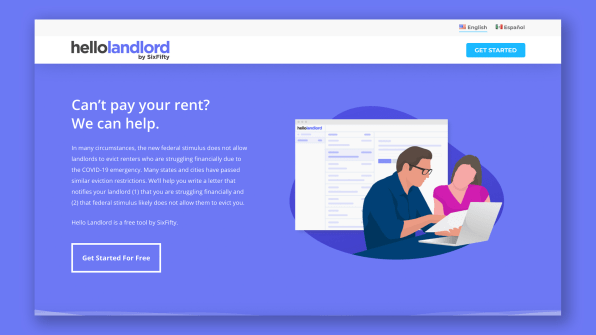Can’t pay rent because of the coronavirus? This site will help you explain your rights to your landlord
Almost one-third of apartment renters in the U.S. haven’t yet paid rent for April, as millions of Americans have lost their jobs because of the coronavirus pandemic. A free tool called Hello Landlord, from legal experts, helps tenants quickly draft a letter to their landlord to explain why they haven’t paid—and outline their right to avoid evictions under the CARES Act, the sweeping aid package signed into law on March 27.
“When the federal government passed and the president signed the CARES Act, we immediately started combing through it,” says Kimball Parker, CEO of SixFifty, the tech subsidiary of the law firm Wilson Sonsini Goodrich & Rosati. One thing they immediately noticed: Any properties with a federally backed mortgage are subject to a temporary moratorium on evictions. “Landlords may not be aware that they can’t evict, and may be filing evictions,” he says. “And renters may not know their rights.” Some local and state governments have also placed temporary moratoriums on evictions.

The group, which makes a variety of automated legal tools—such as a tool that businesses can use to comply with the GDPR, the European Union’s privacy law—adapted an existing tool that it had already developed, along with LawX, the legal design lab at BYU Law School, and the Innovation for Justice program at the University of Arizona College of Law, for renters to send letters to landlords when they couldn’t afford rent. It asks a few simple questions in English or Spanish, and then automatically generates a custom letter that can be sent to the landlord. The new version tweaks the letter for the current coronavirus crisis and the legal changes from the stimulus bill.
Previously, “the power was with landlords,” Parker says. But the new letter takes into account the new protections for renters. The group aims to also add in specific protections for particular locations. In Oakland, California, for example, all residential evictions—not just those with a federally backed mortgage—are banned until the end of May. (Since eviction moratoriums mean that tenants will eventually owe large amounts of back rent, some lawmakers are also trying to put in place temporary rent cancellations.)
The letter is carefully worded. “We’ve tested the type of tone to use with landlords,” he says. “So we get the tone that landlords are looking for. You don’t want to send a letter that says, basically, ‘screw you, you can’t evict me,’ because that would poison your relationship with your landlord moving forward. So it’s actually a pretty delicate balance: You need to let the landlord know that there’s this moratorium on eviction and let them know that you may miss payments, but that you’re still willing to work with your landlord . . . we’ve really put a lot of thought into that and, we think, walk the line in a pretty sophisticated way that may be difficult for somebody to just come out with on their own. And people may not know all of the details of the CARES Act.”
Last week, SixFifty also released a similar tool for homeowners to generate letters to their mortgage lenders. Homeowners can delay making mortgage payments for six months, but need to send a letter to their lender specifically requesting relief. Hundreds of people began using that tool immediately. “We’re hoping, similarly, for the Hello Landlord tool, that hundreds or thousands of people use it during this time, and that it really keeps people in their homes,” Parker says.
(9)



